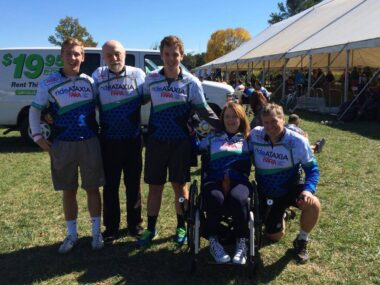Friedreich’s ataxia fundraisers help me feel empowered and connected
rideATAXIA is one of the more popular fundraising activities for FA research
Written by |

My dad — a vital yet balding older man with a gray beard and merry blue eyes — pedaled alongside me. We were participating in a rideATAXIA event, one of the main fundraisers for the Friedreich’s Ataxia Research Alliance (FARA).
He rode his upright bike, and I was on my recumbent trike. It was a beautiful, sunny day with blue skies all around us. We were traveling at a leisurely pace, which is the most my Friedreich’s ataxia (FA) will allow. We had chosen the six-mile route.
Chatting along the way, my dad turned to me at one point and said something I’ll never forget: “This really is a beautiful community. You never want to be part of it, but it is so supportive when you are.”
As we rode by a small group of people cheering, whooping, and ringing cowbells, I was immersed in that sentiment.

Jean Walsh and members of her family attend a rideATAXIA fundraising event in Philadelphia, in October 2015. (Courtesy of Jean Walsh)
Like me, many other FA community members find fundraisers empowering. Empowered people feel better emotionally and are better able to manage their chronic illness.
On that traumatic day in 1981 when I was diagnosed with FA, I was encouraged to wait for researchers to figure out more. I felt disempowered and removed from fighting for cures and treatments. My doctors didn’t offer me hope for either of those in my lifetime.
Maybe they would find us drugs, maybe they wouldn’t. The only option I was given was to wait. The idea of patients and their loved ones being experts on their disease and contributors to a cure was a foreign concept in 1981.
FARA wasn’t founded until 1998. One thing the FARA founders knew at the time was that we patients and our loved ones didn’t have to wait — we could make cures and treatments happen ourselves.
I wish I had figured this out earlier in my FA journey. But I am deeply grateful to the FARA founders who paved this empowering path!
I didn’t find my way to FARA until the late 2000s. By then I had spent over 20 years feeling disempowered. Until then, I thought that cures and treatments were for the medical doctors and PhD students to pursue.
I am an empowered patient
Fundraising events are empowering because we don’t have to wait for a cure. We can help fund the research that will power the cure. We can make this happen not only by soliciting donations, but also by giving speeches, inviting our friends and family to participate, volunteering in various roles that support and enhance an event, and even by hosting our own events.
On that rideATAXIA Sunday, I felt so understood. I felt like such a part of the process of finding cures and treatments, and I felt loved by my community and my dad. I felt powerful over FA. No longer am I waiting for the cure — I am part of finding it.
Last year, we got our first approved treatment for FA. I can confidently say that I and many others were part of making that happen. My most heartfelt thanks goes to everyone from researchers to fundraising event attendees. I’m proud and fulfilled to say that I’m among them!
My friend and fellow former columnist Christina Cordaro describes the rideATAXIA event in Philadelphia well. Of course, there are more than just rideATAXIAs that raise funds for FARA; you can also find runs, soirées, golf tournaments, and more.
I hope everyone with any disease can feel empowered. Attend a fundraising event and, hopefully, it will empower you as much as it has me.
Note: Friedreich’s Ataxia News is strictly a news and information website about the disease. It does not provide medical advice, diagnosis, or treatment. This content is not intended to be a substitute for professional medical advice, diagnosis, or treatment. Always seek the advice of your physician or another qualified health provider with any questions you may have regarding a medical condition. Never disregard professional medical advice or delay in seeking it because of something you have read on this website. The opinions expressed in this column are not those of Friedreich’s Ataxia News or its parent company, Bionews, and are intended to spark discussion about issues pertaining to Friedreich’s ataxia.




Leave a comment
Fill in the required fields to post. Your email address will not be published.